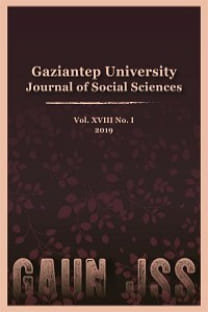Tüketici Tatminini Etkileyen Faktörler: Turizm Sektöründe Bir Uygulaması
Factors Affecting Consumer' Satisfaction: An Application in the Tourism Industry
___
- Asselman, A., Khaldi, M., & Aammou, S. (2021). Enhancing the prediction of student performance based on the machine learning XGBoost algorithm. Interactive Learning Environments, 0(0), 1–20. https://doi.org/10.1080/10494820.2021.1928235
- Bulgan, G., & Soybalı, H. H. (2011). Antalya Belek Bölgesindeki Beş Yıldızlı Otel İşletmelerinde Düşük Sezonda Konaklayan Alman Müşterilerin Hizmet Beklentilerinin Ve Memnuniyet Düzeylerinin Değerlendirilmesi. Journal of Yasar University, 21(6), 3572–3597.
- Chen, T., & Guestrin, C. (2016). Xgboost: A scalable tree boosting system. In New York, NY ACM 2016 (Ed.), Proceedings of the 22nd acm sigkdd international conference on knowledge discovery and data mining (pp. 785–794). Association for Computing Machinery.
- Darini, M., & Khozaei, F. (2016). The study of factors affecting customer’s satisfaction with the three star hotels in Dubai. International Journal of Advanced Engineering, Management and Science (IJAEMS), 2(2), 21–24. Retrieved from www.ijaems.com
- Demirel, Ş., & Yakut, S. G. (2019). Karar Ağacı Algoritmaları ve Çocuk İşçiliği Üzerine Bir Uygulama. Sosyal Bilimler Araştırma Dergisi, 8(4), 52–65.
- Deng, W. J., Yeh, M. L., & Sung, M. L. (2013). A customer satisfaction index model for international tourist hotels: Integrating consumption emotions into the American customer satisfaction index. International Journal of Hospitality Management, 35, 133– 140. https://doi.org/10.1016/j.ijhm.2013.05.010
- Djukic, A., & Vukmirovic, M. (2012). Creative cultural tourism as a function of competitiveness of cities. Technics Technologies Education Management, 7(1), 404–410
- Doğan, S. (2017). Otellere yönelik yapılan puanlama ve çevrimiçi yorumların değerlendirilmesine ilişkin Aksaray ilinde bir araştırma. Aksaray Üniversitesi İktisadi ve İdari Bilimler Fakültesi Dergisi, 9(3), 27–36.
- Emir, O., Kılıç, G., & Pelit, E. (2010). Üç Yıldızlı Otel İşletmelerinde Müşteri Memnuniyeti Üzerine Bir Araştırma. Süleyman Demirel Üniversitesi İktisadi ve İdari Bilimler Fakültesi Dergisi, 15(3), 291–310.
- Fan, G. Z., Ong, S. E., & Koh, H. C. (2006). Determinants of house price: A decision tree approach. Urban Studies, 43(12), 2301–2316. https://www.kaggle.com/ishansingh88/europe-hotel-satisfaction-score
- Hughes, H., & Allen, D. (2005). Cultural tourism in Central and Eastern Europe: The views of “induced image formation agents.” Tourism Management, 26(2), 173–183. https://doi.org/10.1016/j.tourman.2003.08.021
- Irmak, S., & Ercan, U. (2017a). Determining the Affecting Factors of Edible Oil Consumption Using Data Mining Methods. Kafkas Universitesi İktisadi ve İdari Bilimler Fakültesi, 8(15), 57–79. https://doi.org/10.9775/kauiibfd.2017.004
- Irmak, S., & Ercan, U. (2017b). Karar Ağaçları Kullanılarak Türkiye Hanehalkı Zeytinyağı Tüketimi Görünümünün Belirlenmesi. Uluslararası Yönetim İktisat ve İşletme Dergisi, 13(3), 553–564.
- Jabeur, S. Ben, Mefteh-Wali, S., & Viviani, J. L. (2021). Forecasting gold price with the XGBoost algorithm and SHAP interaction values. Annals of Operations Research, 0123456789. https://doi.org/10.1007/s10479-021-04187-w
- Korucuk, S., Akyurt, H., & Turpcu, E. (2019). Otel İşletmelerinde Hizmet Kalitesinin Entropi Yöntemi İle Ölçülmesi: Giresun İlindeki Üç Yıldızlı Oteller Üzerine Bir Araştırma. MANAS Sosyal Araştırmalar Dergisi, 8(1/1), 709–721.
- Liang, Y. H. (2010). Integration of data mining technologies to analyze customer value for the automotive maintenance industry. Expert Systems with Applications, 37(12), 7489–7496.
- Liu, Y. De. (2014). Cultural Events and Cultural Tourism Development: Lessons from the European Capitals of Culture. European Planning Studies, 22(3), 498–514.
- Mo, H., Sun, H., Liu, J., & Wei, S. (2019). Developing window behavior models for residential buildings using XGBoost algorithm. Energy and Buildings, 205, 109564. https://doi.org/10.1016/j.enbuild.2019.109564
- OECD. (2020). OECD Tourism Trends and Policies 2020, 1–16.
- Özçalıcı, M. (2017). Karar Ağaçları ve Genetik Algoritmalar ile İkinci El Otomobil Satış Fiyat Tahmini. Alphanumeric Journal, 5(1), 103–103.
- Özer, Ö., & Günaydin, Y. (2010). Otel İşletmelerinde Müşteri Memnuniyeti Ve Müşteri Sadakati İlişkisi: Dört Yıldızlı Otel İşletmelerinde Bir Uygulama. Dokuz Eylül Üniversitesi İşletme Fakültesi Dergisi, 11(2), 127–154.
- Padma, P., & Ahn, J. (2020). Guest satisfaction & dissatisfaction in luxury hotels: An application of big data. International Journal of Hospitality Management, 84(102318).
- Radojevic, T., Stanisic, N., & Stanic, N. (2015). Ensuring positive feedback: Factors that influence customer satisfaction in the contemporary hospitality industry. Tourism Management, 51, 13–21. https://doi.org/10.1016/j.tourman.2015.04.002
- Ren, L., Qiu, H., Wang, P., & Lin, P. M. C. (2016). Exploring customer experience with budget hotels: Dimensionality and satisfaction. International Journal of Hospitality Management, 52, 13–23. https://doi.org/10.1016/j.ijhm.2015.09.009
- Sim, J., Mak, B., & Jones, D. (2006). A model of customer satisfaction and retention for hotels. Journal of Quality Assurance in Hospitality and Tourism, 7(3), 1–23.
- UNWTO. (2018). European Union Tourism Trends. World Tourism Organization. https://doi.org/10.18111/9789284419470
- Wang, F., Yu, J., Liu, Z., Kong, M., & Wu, Y. (2021). Study on offshore seabed sediment classification based on particle size parameters using XGBoost algorithm. Computers and Geosciences, 149(January), 104713.
- Wang, X., Wang, L., Wang, S., Chen, J. fang, & Wu, C. (2021). An XGBoost-enhanced fast constructive algorithm for food delivery route planning problem. Computers and Industrial Engineering, 152(December 2020), 107029.
- Wilkins, H. (2010). Using importance-performance analysis to appreciate satisfaction in hotels. Journal of Hospitality Marketing and Management, 19(8), 866–888.
- Zhou, L., Ye, S., Pearce, P. L., & Wu, M. Y. (2014). Refreshing hotel satisfaction studies by reconfiguring customer review data. International Journal of Hospitality Management, 38, 1–10.
- ISSN: 1303-0094
- Yayın Aralığı: Yılda 4 Sayı
- Başlangıç: 1991
- Yayıncı: Gaziantep Üniv. Sosyal Bilimler Enst.
Osmanlı Devleti'ndeki Haraç Vergisinin Klasik Türk Şiirine Yansıması
Comparison of the Financial Performance of Turkish Cement Firms with Fuzzy SWARA-COPRASMAUT Methods
Kanun Hükmünde Kararnameler ile Cumhurbaşkanlığı Kararnamelerinin Karşılaştırılması
Bayram DOĞAN, Ali Fuat GEYİK, Emine Esra BOZKURT
Haber Ajanslarının Anlık Mesajlaşma Servisi Kullanımı Üzerine Bir İnceleme: Telegram Örneği
IRAK TÜRKMEN KÜLTÜRÜNDE VE SİYASI SÖYLEMLERİNDE KATLİAMLAR NASIL ANILMAKTADIR?
Alexei Navalny ve Rusya'daki Protestolar: Otoriter Rejim Altında Çevrimiçi Aktivizmin Gelişmesi
Şebnem İşigüzel’in Çöplük Romanında Yeraltı Edebiyatı’nın İzleri
Şebnem İşigüzel'İn Çöplük Romanında Yeraltı Edebiyatı'nın İzleri
Y KUŞAĞININ ÖRGÜTSEL BAĞLILIK VE SADAKATİ: SİYASİ PARTİLER ÜZERİNE BİR İNCELEME
